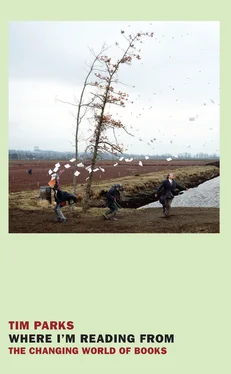How would this situation change the way a writer works? Would it make sense now to write the thriller, literary or otherwise, that was once packaged and sold to entertain and to earn? Would I really want to write all those pages, if there wasn’t even the chance of an income? Maybe yes. There is fan fiction after all. But many writers would not. “No man but a blockhead ever wrote, except for money,” Samuel Johnson once remarked. I’m not with him 100 percent, but I know where he’s coming from. One sees here the difference from the music industry: unable to police their copyright on CDs, musicians nevertheless go on writing songs and can enjoy the feedback and hopefully some income from performing them to an appreciative public; if the songs happen to catch on through the Internet then the musicians can enjoy notoriety and expect bigger concerts, if not a huge income from selling albums. But there is no such performance possibility for the prose thriller, or even the great American novel. Without the prospect of money, the author would have to think very hard about what he really wants to write and how he plans to engage with an eventual community of readers whose appreciation, if not cash, must suffice to give him the gratification and encouragement he seeks. In short, you wouldn’t launch blindly into a major novel, as so many young writers do, simply because novels are the form that command attention and promise an income.
As soon as we put it like this, as soon as we imagine, or try to imagine, the extraordinary confusion, creative and otherwise, that might occur, the many and fragmented ways people might enjoy and share and despair of putting together reflections and entertainments in words for each other, you can see that it is not going to happen. There is still an enormous demand for the long traditional novel, for works that reinforce the idea of an individual whose identity is projected through time and who achieves some kind of wisdom or happiness through many vicissitudes. There is simply no form of escapism, mental immersion, or sustained illusion quite like the thousand-page fantasy narrative, whether it be the endless Harry Potters or the Millennium trilogy; if to have that experience we have to guarantee a substantial income to its creator then society will continue to find a way to do that, in the same way European soccer clubs still find ways to pay exorbitant salaries to their star players.
Copyright, we see, is not essentially driven by notions of justice or theories of ownership, but by a certain culture’s attachment to a certain literary form. If people only read poetry, which you can never stop poets producing even when you pay them nothing at all, then the law of copyright would disappear in a trice.
THE DULL NEW GLOBAL NOVEL
NOT ALL WRITERS share the same sense of whom they are writing for. Many may not even think they are directing their work at any audience in particular. All the same, there are clearly periods of history when, across the board, authors’ perceptions of who their readers are change, something that inevitably leads to a change in the kind of texts they produce. The most obvious example is the period that stretches from the fourteenth to the sixteenth century when writers all over Europe abandoned Latin for the vernacular. Instead of introducing their work, as before, into an international arena presided over by a largely clerical elite, they “descended” to local and national languages to address themselves to an emerging middle class.
In the history books this shift to the vernacular tends to be presented as a democratic inspiration that allowed a wealth of local vitality into the written text and brought new confidence to the rapidly consolidating national languages. That said, it was probably driven as much by ambition and economic interest as by idealism. There came a point when it no longer made sense to write in Latin because the arbiters of taste were now a national rather than international grouping. Today we are at the beginning of a revolution of even greater import that is taking us in a quite different direction.
As a result of rapidly accelerating globalization we are moving toward a world market for literature. There is a growing sense that for an author to be considered “great,” he or she must be an international rather than a national phenomenon. This change is not perhaps as immediately evident in the US as it is in Europe, thanks to the size and power of the US market and the fact that English is generally perceived as the language of globalization, so that many more translations go out of English rather than into it. However, more and more European, African, Asian and South American authors see themselves as having “failed” if they do not reach an international audience.
In recent years authors in Germany, France, and Italy—all countries with large and well-established national readerships—have expressed to me their disappointment at not having found an English-language publisher for their works; interestingly, they complain that this failure reflects back on their prestige in their home country: if people don’t want you elsewhere, you can’t be that good. Certainly, in Italy where I live, an author is only thought to have arrived when he is published in New York. To appreciate how much things have changed one only need reflect that the reputations of writers like Zola or Verga would not have been dented at all by a failure to achieve publication in London.
This development has been hugely accelerated by electronic text transmission. Today, no sooner is a novel or even an opening chapter complete, than it can be submitted to scores of publishers all over the world. It is not unusual for foreign rights to be sold before the work has a local publisher. An astute agent can then orchestrate the simultaneous launch of a work in many different countries using promotional strategies that we normally associate with multinational corporations. Thus a reader picking up a copy of Dan Brown’s The Lost Symbol , or the latest Harry Potter, or indeed a work by Umberto Eco, or Haruki Murakami, or Ian McEwan, does so in the knowledge that this same work is being read now, all over the world. Buying the book, a reader becomes part of an international community. This perception adds to the book’s attraction.
The proliferation of international literary prizes has guaranteed that the phenomenon is not restricted to the more popular sector of the market. Despite its questionable selection procedures and often bizarre choices, the Nobel is seen as more important than any national prize. Meanwhile, the International IMPAC in Ireland, Premio Mondello in Italy, and the International Literature Award in Germany—prizes aimed at “international” literature rather than works from the country in question—are rapidly growing in prestige. Thus the arbiters of taste are no longer one’s own compatriots—they are less easily knowable, not a group the author himself is part of.
What are the consequences for literature? From the moment an author perceives his ultimate audience as international rather than national, the nature of his writing is bound to change. In particular one notes a tendency to remove obstacles to international comprehension. Writing in the 1960s, intensely engaged with his own culture and its complex politics, a novelist like Hugo Claus apparently did not care that his stories would require a special effort on the reader’s and above all the translator’s part if they were to be understood outside his native Belgium. In sharp contrast, contemporary authors like the Norwegian Per Petterson, the Dutch Gerbrand Bakker, and the Italian Alessandro Baricco offer us works that require no such knowledge or effort, nor the rewards that such effort will bring. More importantly, the language is kept simple. Kazuo Ishiguro has spoken of the importance of avoiding word play and allusion to make things easy for the translator. Scandinavian writers I know tell me they avoid character names that would be difficult for an English reader.
Читать дальше












